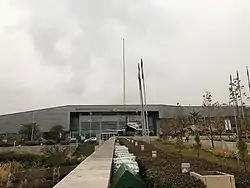Holy Defense Museum
The National Museum of the Islamic Revolution and Holy Defense (Persian: موزه ملی انقلاب اسلامی و دفاع مقدس, Muze-ye Melli-e enghelab-e eslami ve defa'-e moghadas), located in Tehran on a landscaped site of 21 hectares, is one of the largest museums of Iran. It is dedicated to the Iran–Iraq War (1980–1988),[1] the conflict known in Iran as "imposed war"[2] or mainly "Holy Defense".[3][4] The museum consists of different parts such as Tomb of the Unknown Soldiers, flag tower, open area and lake, parking, conference halls,[5] Khorramshahr Mosque, Library and Panorama museum.[6] The main building of museum consists of 8 halls;[7] each displays a specific concept of war [8] through many monitors, video projectors, hologram showcases and some other modern technologies.[9]
موزه ملی انقلاب اسلامی و دفاع مقدس Muze-ye Melli-e enghelab-e islami ve defa'-e moghadas | |
 Holy Defense Museum | |
| Established | 2010 |
|---|---|
| Location | Sarv Street, Haqani Highway, Vanak, Tehran, Iran |
| Coordinates | 35°45′11″N 51°25′31″E |
| Type | Military museum |
| Director | Ali Asghar Jafari |
| Architect | Zhila Norouzi |
| Owner | Municipality of Tehran |
| Website | iranrhdm.ir |
References
- "Tehran museum lionises war in which Iran took on 'world'". Express Tribune. Retrieved 19 October 2018.
- "War museum embodies Iran's search for meaning in Iran-Iraq war". En.rfi.fr. 20 May 2017.
- "Inside Iran's museum to its wartime past". Edition.cnn.com. 7 September 2016.
- "باغ موزه دفاع مقدس کجاست؟". Irna.ir.
- "جاذبه های گردشگری تهران". Sfarme.com. Retrieved 19 October 2018.
- "History". Holy Defense Museum. Retrieved 19 October 2018.
- "Garden of the Holy Defense Museum". Kanoon.net. Retrieved 1 January 2019.
- "Holy Defense Museum in Tehran". Toursiniran.com. Retrieved 1 January 2019.
- "Sacred Defense Museum, permanent museum of Sacrifice and Resisitance". Kojaro.com. Retrieved 1 January 2019.
Further reading
- Vanzan, Anna (2020). "The Holy Defense Museum in Tehran, or How to Aestheticize War". Middle East Journal of Culture and Communication. 13 (1): 63–77. doi:10.1163/18739865-01301004. S2CID 219474804.
External links
- Official website (in Persian)